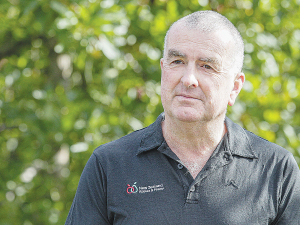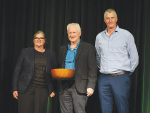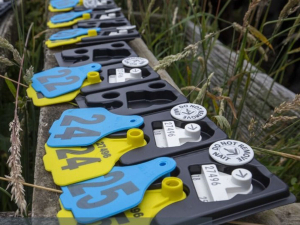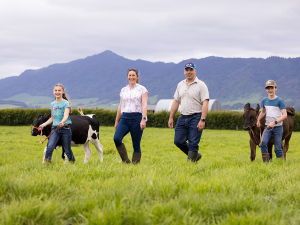Alan Pollard stepped down as chief executive of NZ Apples and Pears Inc. (NZAPI) late last year after over nine years in the role. He talks to Sudesh Kissun about the highlights and challenges.
Alan Pollard joined the apple and pear industry in March 2012, having had no experience in horticulture.
He says it was an incredible journey, during which he developed a huge respect for growers.
Pollard says he saw the export earnings grow from $340m in 2012 to $920m in 2020; the NZ apple industry was named the world's most competitive apple industry in 2015 and has kept that spot ever since.
"I saw great advancement in varietal development and the adoption of new technology and innovation. And I saw the difference that the industry makes to the health and well-being of people and communities, not just in New Zealand but across the Pacific, throught the Recognised Seasonal Employer (RSE) scheme," he told Hort News.
"Most importantly, I developed a huge respect for the growers. They genuinely care about their people and their produce, and they work extremely hard in often trying condition."
He says growers have been - and continue to be - severely tested with the labour shortage and supply chain disruption.
"But they are resilient, and they will always be an important contributor to New Zealand's economoc and social outcomes."
Pollard made the decision to step down from early in 2021, putting in place a six-mont exit strategy to ensure a smooth handover to his successor.
He thought the time was right to hand over the reins to someone else.
"Having held the role for 9½ years, entered a new pahase of the Covid pandemic, and overseen some structural changes at NZAPI that better positioned the organisation to focus on its key priorities for the future, the time was right to step aside in favour of a new leader who could bring a different set of skills and experience to the table."
Pollard isn't surprised by the growth in apple and pear export earnings.
He says what is important to note is that about 80% of this growth is value rather than volume driven, which means the industry is extracting greater value per metric tonne than it ever has.
"This is not surprising and is the result of years of innnovation and good decision making: breeding world leading varieties; growing fruit in a sustainable and environmentally friendly way; innovation in tree architecture leading to much higher productivity; the continued development of the RSE scheme, providing confidence that the fruit would be harvested at the optimum time for optimum quality and therefore optimum value," he says.
Post-harvest innovation is also leading to only the best fruit making it to market, while sophisticated global marketing programmes ensure that product delivery matches consumer core values and demand.
"The global success of the industry over the past decade has attracted new entrants into the sector, including increasing interest from Māori enterprises," says Pollard.
He is proud to have built a team of outstanding individuals collectively focused on supporting growers to be the best.
"When we set the NZAPI strategy, one of the goals was to become the exemplar industry association.
"I think that we certainly became recognised as the primary source of the truth for the industry, and a credible and trustworthy partner.
"The work that the team has done has been recognised across local and central government, and across the primary sector."
A Great Success
During his tenure Alan Pollard was closely involved in the Recognised Seasonal Employer (RSE) shceme where Pacific Island workers return to NZ every year to work on orchards for several months.
Pollard believes the RSE scheme has been incredibly successful and has been one of the key factors that influenced industry growth and success over the past 15 or so years.
Returning RSE workers are highly skilled, highly motivated, and highly productive, he adds.
"For the industry, the scheme provides confidence that the fruit will be harvested at the optimum time for optimum quality and therefore optimum value," Pollard told Hort News.
"Harvest is physically challenging, and in the orchard the strength and fitness of the Pacific workers has seen them undertake the tasks that New Zealanders either can't or won't do.
"These are highly skilled and motivated people who take pride in what they do and are highly motivated to succeed for the benefit of their families and communities."
For the Pacific nations, the money that is earned in New Zealand is reinvested back in their home countries.
Pollard says this has completely transformed families and communities.
"Of course, there are challenges - workers separated from their families for an extended period (which has been particularly hard during the Covid border closures) and ensuring a fair distribution of opportunities to participate in the scheme across the Pacific.
"But the benefits are significant. I believe that the scheme is one of New Zealand's most successful support programmes, and it has been recognised as one of the most ethical migratory labour schemes in the world.


















